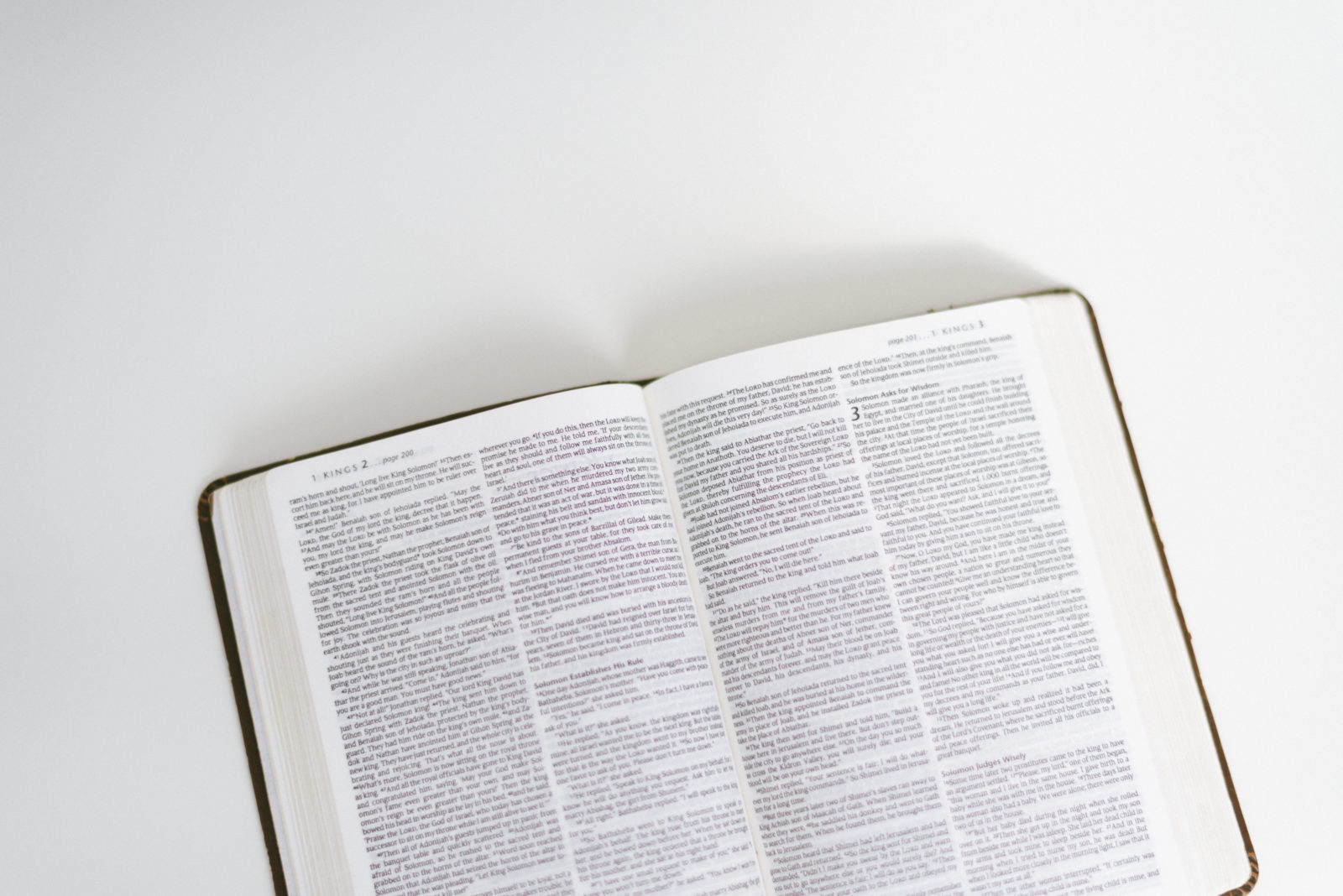The Bible states in Acts 2 that “they devoted themselves to the apostle’s teaching and fellowship, to the breaking of bread and the prayers.” The first characteristic of a healthy church is a devotion to the teaching of God’s word. Our Confession of Faith is simply a summary of biblical teaching that explains what we as a local church agree the Bible teaches about God, the Bible, sin, the church, etc. At Two Rivers, we believe we are to live as God has directed us in His Word. We hold to essential doctrines that are core to historic reformed Christianity. The TRCC Confession of Faith adopted in 2010 is based primarily on the Abstract of Principles.
[The Baptist Catechism referred to is the version published by Reformed Baptist Publications. It is a slightly modernized and edited version of a document published by the Particular Baptist General Assembly which met in London in 1693]
I. The Scriptures
The Scriptures of the Old and New Testaments were given by inspiration of God, and are the only sufficient, certain, infallible, and authoritative rule of all saving knowledge, faith, and obedience.
2 Timothy 3:16-17; Psalm 19:7-11; 2 Peter. 1:19-21; Ephesians 2:20
See Baptist Catechism #3, #5-#7
II. God
There is but one living and true God, the Creator, Preserver and Ruler of all things, having in and of Himself, all perfections, and being infinite in them all; and to Him all creatures owe the highest love, reverence, and obedience.
Deuteronomy 6:4; Genesis 1:1-31; Acts 17: 24-28; I Timothy 1:17; Psalm 115:3; Mark 12:30; Revelation 5:12-14. See Baptist Catechism #1, #2, #4, #8, #9, #13
III. The Trinity
God exists as three persons, the Father, the Son, and the Holy Spirit each with distinct and harmonious offices in the great work of redemption, but without division of nature, essence, or being.
2 Corinthians 13:14; Matthew 28:19; Exodus 3:14; John 14:11; 1 Corinthians 8:6; Acts 5:3-4. See Baptist Catechism #9, #10
IV. Providence
God from eternity, decrees all things that comes to pass, and perpetually upholds, directs, and governs all creatures and all events; yet so as not in any way to be the author or approver of sin nor to destroy the will and responsibility of intelligent creatures.
Isaiah 46:9-10; Ephesians 1:11; Hebrews 1:3; Psalms 135:6; Psalms 103:19; Daniel 4:35; Genesis 50:20; Acts 2:23, 4:27-28 See Baptist Catechism #11-#16
V. Election
Election is God’s eternal choice of many persons unto everlasting life—not because of foreseen merit in them, but of His mere mercy in Christ—in consequence of which choice they are called, justified, and glorified.
Exodus 33:19; Deuteronomy 7:6-7; Matthew 11:27, 22:14; 9:11-13;Ephesians.1:4-5; Revelation 13:8, Romans 8:28-30 See Baptist Catechism #24
VI. The Fall of Man
God originally created man in His own image, and free from sin; but, through the temptation of Satan, he (Adam) transgressed the command of God, and fell from his original holiness and righteousness. As a consequence, the guilt of his sin was imputed to all his posterity, they are under condemnation, and inherit a nature corrupt and wholly opposed to God and His law, from which proceed all actual transgressions.
Genesis 1:26-30; Genesis 3:1-24 Psalm 51:5; Ephesians 4:22-24; Romans 5:12-19; Ephesians 2:1-3; Romans 1:18-32, 3:23 See Baptist Catechism #14-#23
VII. The Mediator
Jesus Christ, the only begotten Son of God, is the divinely appointed Mediator between God and man. Being in very nature God and having taken upon Himself human nature, yet without sin, He perfectly fulfilled the law, suffered, and died upon the cross for the salvation of sinners. He was buried and rose again the third day, and ascended to His Father, at whose right hand He ever lives to make intercession for His people. He is the only Mediator, the Prophet, Priest and King of the Church, and Sovereign of the Universe.
Psalms 2:6-12; Luke 1:35; John 1:1-18; Isaiah 53:1-12; John 19:1-20:18; 1 Peter 2:24; 1 Corinthians 15:3-4; Ephesians 1:20-23; Hebrews 1:1-3; 7:25 See Baptist Catechism #24-#32
VIII. Regeneration
Regeneration is a change of heart, brought about by the Holy Spirit, who brings the dead in trespasses and sins to life, enlightening their minds spiritually and savingly to understand the Word of God, renewing their whole nature, thereby effectually drawing them to Jesus Christ so that they love and practice holiness. It is a work of God’s free and special grace alone.
Ezekiel 36:26-27; John 1:12-13; John 3:3-8; 1 Corinthians 2:10-14; 6:11; Ephesians 2:1-10;Titus 3:5-6; II Corinthians 5:17 See Baptist Catechism #33-#35, #94-#96
IX. Repentance
Repentance is a God-given grace, wherein a person is made sensible of the manifold evil of his sin by the Holy Spirit. He then humbles himself with godly sorrow, self-abhorrence, and detestation of his sin, with a purpose and endeavor to walk before God so as to please Him in all things.
Acts 5:31, 11:18; 2 Timothy 2:24-26; Matthew 5:3-6; 2 Corinthians 7:9-11
See Baptist Catechism #45-#91, #93
X. Faith
Saving faith is the belief, on God’s authority, of whatsoever is revealed in His Word concerning Christ; accepting and resting upon Him alone for justification and eternal life. It is brought about in the heart by the Holy Spirit, and is accompanied by all other saving graces, and leads to a life of holiness.
John 1:12-13; Ephesians 2:8-9; Galatians 2:16; Philippians 3:9; Acts 13:48, 16:14; Philippians 1:29 See Baptist Catechism #34-#35, #91-#92
XI. Justification
Justification is a judicial act of God’s grace wherein He declares a person righteous in His sight because of the imputed righteousness of Christ. Justification is by grace alone, through faith alone, in Christ alone. The individual who is thus legally restored has a right standing with God and all his sin has been forgiven.
Romans 3:21-26; Romans 4:3-8; 1 Corinthians 1:30-31; 2 Corinthians 5:21; Titus 3:5-7; Hebrews 9:11-14; 1 Peter 2:24. See Baptist Catechism #36-#38
XII. Sanctification
Sanctification is the process by which those who have been regenerated are made more holy, by God’s Word and Spirit dwelling in them. This sanctification is progressive through the supply of Divine strength, by which all saints are enabled more and more to die to sin and live unto righteousness.
1 Corinthians 1:30; Ephesians 4:22-24; Romans 6:11; Philippians 2:12-13; Titus 2:11-14; 2 Thessalonians 2:13 See Baptist Catechism#36, #39, #45-#89, #95-#96
XIII. Perseverance of the Saints
Those whom God has accepted in the Beloved and sanctified by His Spirit will never totally and finally fall away from the state of grace, but shall certainly persevere until the end. Though they may fall through neglect and temptation into sin by which they grieve the Holy Spirit and come to be deprived of some measure of their graces and comforts, bringing reproach on the Church, and temporal judgments on themselves, yet, they shall be renewed again unto repentance and be kept by the power of God through faith unto salvation.
Ephesians 1:5-6; John 6:35-40, 10:27-30; Romans 8:29-30, 35-39;1 Thessalonians 5:23-24; Philippians 1:6; 1 John 2:19, 5:4; Jude 1:24-25 See Baptist Catechism #40, #106-#115
XIV. The Church
The Lord Jesus is the Head of the Church, which is composed of all true disciples, and in Him is invested supremely all power for its government. According to His commandment, Christians are to associate themselves into local churches; and to each of these churches He has given needful authority for administering that order, discipline, and worship which He appointed. The regular officers of a church are Overseers (Pastors) or Elders, and Deacons.
Matthew 16:15-19; Ephesians 1:22-23; Colossians 1:18; Acts 2:41-42, 47; 1Timothy 3:1-15; 1 Peter 5:1-5; Titus 1:5-9; Acts 20: 17, 28. See Baptist Catechism #102
XV. Baptism
Baptism is the immersion of a believer in water in the name of the Father, the Son, and the Holy Spirit. It is an ordinance of the Lord Jesus Christ and is therefore an act of Christian obedience symbolizing the believer’s union with the death, burial, and resurrection of Christ; and the believer’s death to sin, the burial of the old life, and the resurrection to walk in newness of life in Christ Jesus. It is a prerequisite to the privileges of church membership and to participation in the Lord’s Supper.
Matthew 28:19-20; Mark 1:9-11; Acts 2:41-42; Romans 6:3-5; Colossians 2:9-12.
See Baptist Catechism #97-#102
XVI. The Lord’s Supper
The Lord’s Supper is a symbolic ordinance of the Lord Jesus Christ, to be administered with the elements of bread and the fruit of the vine, and to be observed by His churches until the end of the world. It is designed to commemorate Christ’s death, to confirm the faith and other graces of Christians, and to be a bond, pledge, and renewal of their communion with Him, and of their church fellowship.
Matthew 26:26-30, 28:19-20; Mark 14:22-26; Luke 22:17-20; Acts 2:42, 46, 20:7;
1 Corinthians 10:16-17, 21, 11:23-29. See Baptist Catechism #103-#105
XVII. The Lord’s Day
The first day of the week is the Lord’s Day. It is a Christian institution for regular observance, commemorating the resurrection of Christ from the dead. It is intended to be a day of rest and delighting in the Lord through exercises of worship and spiritual devotion, both public and private.
Exodus 20:8-11; Isaiah 58:13-14; Matthew 12:1-12, 28:1 ff.; Mark 2:27-28, 16:1-7; Luke 24:1-3; John 4:21-24, 20:1; Acts 20:7; 1 Corinthians 16:1-2; Colossians 2:16-17; Hebrews 10:23-25; Revelation 1:10.
See Baptist Catechism #63-#68
XVIII. Marriage and Family
Marriage was instituted by God as the joining of one man and one woman with the promise of being faithful to one another for a lifetime. Adam and Eve were made to complement each other in a one-flesh union that establishes the only normative pattern for sexual relations for men and women. Marriage ultimately serves as a type of the union between Christ and His Church. Children, from the moment of conception, are a blessing and a gift from the Lord. God has given parents the obligation to raise their children in the discipline and instruction of the Lord.
Genesis 1:26-28; 2:15-25; Exodus 20:12; Deuteronomy 6:4-9; Joshua 24:15; Psalm 127:3-5; Mark 10:2-12; Ephesians 5:21-33; 6:1-4 See Baptist Catechism #14, #76-#78, #85-#87
XIX. Civil Government
Civil government is of divine appointment for the interests and good order of human society. It is the duty of Christians, therefore, to pray for and be in subjection to the governing authorities, except in matters that are opposed to the revealed will of the Lord Jesus Christ, who is the only Lord of the conscience and the Prince of the kings of the earth.
Romans 13:1-7; Deuteronomy 16:18; I Timothy 2:1-8; Acts 5:29; Daniel 3:15-18, 6:7-10; Acts 4: 18-20; Psalm 2:1-12; Romans 14:9-13. See Baptist Catechism #30
XX. The State of Man after Death
The bodies of men after death return to dust, but their souls return immediately to God. The souls of the righteous will be made perfect in holiness and received into paradise, where they are with Christ, beholding the face of God and waiting for the full redemption of their bodies. The souls of the wicked will be cast into hell, where they remain in torment and utter darkness kept until the day of judgment at the Second Coming of Christ.
Genesis 3:19; Ecclesiastes 12:7; Job 19:26-27; Luke 23:43; Philippians 1:23; 1 Corinthians 13:12; Luke 16:23; Jude 1:6-7. See Baptist Catechism #41, #43
XXI. The Resurrection and the Judgment
According to His promise, Jesus Christ will return personally and visibly in glory to the earth; the bodies of all the dead will be raised, both the wicked and the righteous; and Christ will judge all men in righteousness. The wicked will go into everlasting punishment and the righteous, in their resurrected and glorified bodies, into everlasting life.
Matthew 16:27, 25:31-46; John 5:28-29; 1 Thessalonians 4:16-17; 1 Corinthians 15:24-28, 35-58; 2 Corinthians 5:10; Philippians 3:20-21; 1 John 3:2; Revelation 20:11-15, 22:3-5.
See Baptist Catechism #42, #44.


